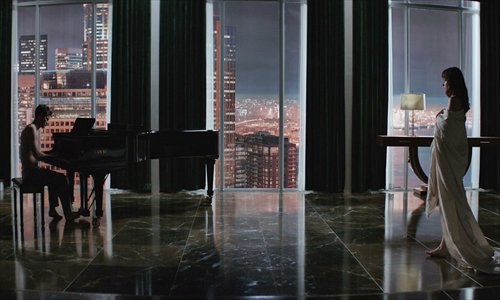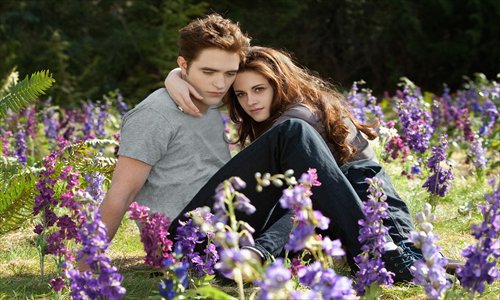Why are ‘Mary Sue’ stories so popular in today’s China?

Mary Sue stories, which first appeared in the US in the 1970s, have been one of the most popular fiction genres in China in recent years. Photo: IC
Daydreaming about the kind of life one wishes one had, rather than the life that one actually must live, has long been the refuge of frustrated adolescents. Now this seemingly frivolous pastime is being pegged as the basis for one of China's most popular fiction genres in recent years - the "Mary Sue" story.
"Fifty Shades of Grey, Twilight, The Legend of Zhen Huan, and The Empress of China, are all examples of Mary Sue stories," said Huo Zhi (pen name), an independent film critic who has over 15,000 subscribers on WeChat.
The origin of the term Mary Sue can be traced to character in a Star Trek fan fiction written by Paula Smith in 1973 that appeared in second issue of the fanzine Menagerie. By 1976, the editors of the fanzine had already begun to express their displeasure with the trope of Mary Sue characters.
According to Huo, the term Mary Sue is generally used to describe a female character that serves the purpose of wish-fulfillment for the author.
Typically, a Mary Sue character will be an idealized version of the author herself, being exceptionally beautiful, implausibly talented, devoid of flaws, and admired, envied, or beloved by all other characters in the story.
In China, perhaps the most well-known work that has been described as a Mary Sue story by critics and Internet users is The Legend of Zhen Huan, a palace drama following the intrigues of the eponymous character that was first published under the pen name of Liu Lianzi in 2007.
The online novel, which has over 4.8 million views on sohu.com, was adapted into a 76-episode TV series in 2011, and recently re-edited and released on US-based film and television subscription service Netflix.
A follow-up to the novel, titled The Legend of Ru Yi, was serialized online in 2012, and is currently being adapted into a TV series by the media company New Classics China.
"I love the detailed descriptions of [Zhen Huan's] beauty, of her thoughts, and of the romantic relationships between her and the three handsome, strong men [who court her]," said Liang Zimeng, a 16-year-old student in Beijing, who describes herself as an avid fan of Liu Lianzi's works. "Sometimes, I wish I were her."
Appetite for wish fulfillment
According to Huo, a large number of Mary Sue stories are based around courtship and romantic entanglement, and the audience for Mary Sue stories in China are primarily adolescent girls.
"The reason I like reading and watching Mary Sue stories is because I can be swept away by the beautiful romantic relationships," said Liang. "The heroine doesn't stick to one man, and no one blames her."
Yang Rong, a psychology professor at the Chinese Academy of Sciences, said that the popularity of Mary Sue stories among young girls in China was driven by the narcissistic world view typical of teenagers, and the aspiration to become independent and to have adult experiences.
"As China's economy has become more developed, children are maturing and starting to fantasize about experiences like having romantic relationships at an earlier age," said Yang.
While overindulging in the narcissistic fantasies provided by Mary Sue fiction could be harmful in creating unrealistic expectations about real life, said Yang, there was nothing unusual or unhealthy about narcissistic fantasies themselves, particularly during adolescence, when a person's imagination was especially active.
"It's normal for a mentally healthy person to be somewhat narcissistic, which can be expressed in various ways," said Yang. "Mary Sue fiction creates a mental stage to fulfill people's desire for attention, to be cared about, and to be flawless, perfect and powerful."
Mary Sue stories also serve the purpose of giving young people a template of an ideal personality to imitate, said Yang.
He suggested that for the 1970 and 1980 generations, the romantic fictions of Taiwanese author Chiung Yao fulfilled a similar role for readers as a form of aspirational fantasy.
Liang said that the first Mary Sue story she ever read was a piece of fan fiction set in the world of Slam Dunk, a popular Japanese manga comic about a high school basketball team that was adapted into an animation series in 1993.
"The Mary Sue character was the same age as me, and had a similar mentality to life as me, so I was able to perfectly identify with her," she said. "[Reading it] was as if I was in the cartoon world myself, and having these romantic relationships with the handsome basketball players."

Critics say Fifty Shades of Grey, Twilight, The Legend of Zhen Huan and The Empress of China are all examples of Mary Sue stories that have attracted a large following around the world. Photo: CFP
A writer's perspective
Huo shared Yang's view that Mary Sue fiction gave readers an outlet for wish fulfillment, but he noted that most of the time, the term is used derogatorily.
"[The term Mary Sue is associated with stories] that are ridden with clichés, that are excessively indulgent and too subjective to the author," said Huo.
"Mary Sue characters are usually flat and have no authentic sense of personality or uniqueness, and are just a product of self-aggrandizement. In artistic terms, they are complete failures."
Qin Yunuo, a 14-year-old writer of Mary Sue stories and junior high school student in Jinan, Shandong Province, said she is aware of criticisms of the genre.
Qin's most recent story, titled Magic Imperial Concubine, was serialized on hongxiu.com, a website for popular novels, and has more than 40,000 views.
"I know the story is way too Mary Sue and there are lots of these kinds of stories on the Internet," she said. "But my readers loved it and I managed to earn over 3,000 yuan ($483) from [donations to the website] for my story."
Magic Imperial Concubine tells the story of a modern girl who is transported back in time, becoming an ancient princess with magical powers. In this ancient world, five kings compete for her romantic attentions.
Qin said that although some might criticize Mary Sue stories, what she valued most was being able to live through the events experienced by her characters during the process of writing.
"I felt I was the princess when I was writing the story," said Qin. "I cried for around half an hour when I had to write the death scene for one of the kings."
Qin said she started writing novels when she was 11. During that time, around 80 percent her female classmates were also writing Mary Sue stories, she said.
While most of her classmates have now given up, Qin is determined to continue.
"Recently, I saw the TV series Cruel Romance and Legend of Fragrance, which are both very popular and share the same style as the stories I write," said Qin. "I think in the near future, I can write a script like that."
Is Anastasia Steele a Mary Sue?
Huo said that he considered Fifty Shades of Grey, an erotic novel by E. L. James that was recently adapted into a film, to be an example of a modern Mary Sue story that has achieved popular success.
"I've heard that the novel was originally written as a piece of Twilight fan fiction, and the leading characters were [the main characters] Bella Swan and Edward Cullen," said Huo.
"If you read Twilight, you have the sense that the author is simply putting herself into this fantasy of being a delicate, innocent woman whose affections these two handsome, powerful guys fight for."
Likewise, with Fifty Shades of Grey, said Huo, the main character of Anastasia Steele is an avatar, or manifestation, of the author herself, living out a fantasy.
"[Because of this], many people can identify with it, and that's why they love it."
Like Yang, Huo made reference to Taiwanese novelist Chuing Yao when asked about the social significance of Mary Sue novels.
"In the 1980s, when Chiung Yao's popular romance novels came to our lives, it allowed us to daydream about love, about relationships and romance," he said.
"In those times, we were ashamed to harbor such fantasies about love, and those daydreams could only be written down in a secret diary, or just kept hidden in one's heart…Now however, these fantasies and daydreams can be openly made into novels and TV shows, allowing people to freely indulge in these beautiful fantasies."
Newspaper headline: Perfect heroine